In the engaging, instructive and endlessly intriguing account of how Peter Beattie came to be Queensland’s long serving premier in the years between 1998 and 2007 - and went on to distinguish himself in a succession of high profile public roles - two stories emerge, interweave and somewhere in the 1980s, come together as a single focussed narrative.
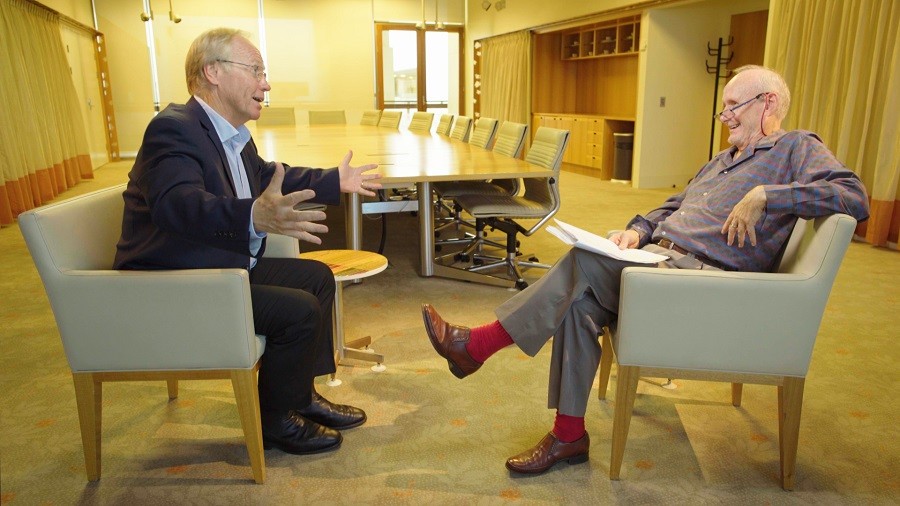
Screen shot from the video-recording "The Hon. Peter Beattie in conversation with Peter Shooter". Filmed at State Library of Queensland in March 2019.
The first story, the personal one, is as much about what inspires passion and determination to bring about societal change as it is about the quite remarkable circumstances of Peter Beattie’s early life. The initial picture we have of this story’s protagonist is of a small child, born into difficult circumstances, the youngest of seven children, who lost his mother before he turned five. At the age of seven he is sent to live with his grandmother in the northern Queensland town of Atherton where he went on to spend his formative years.
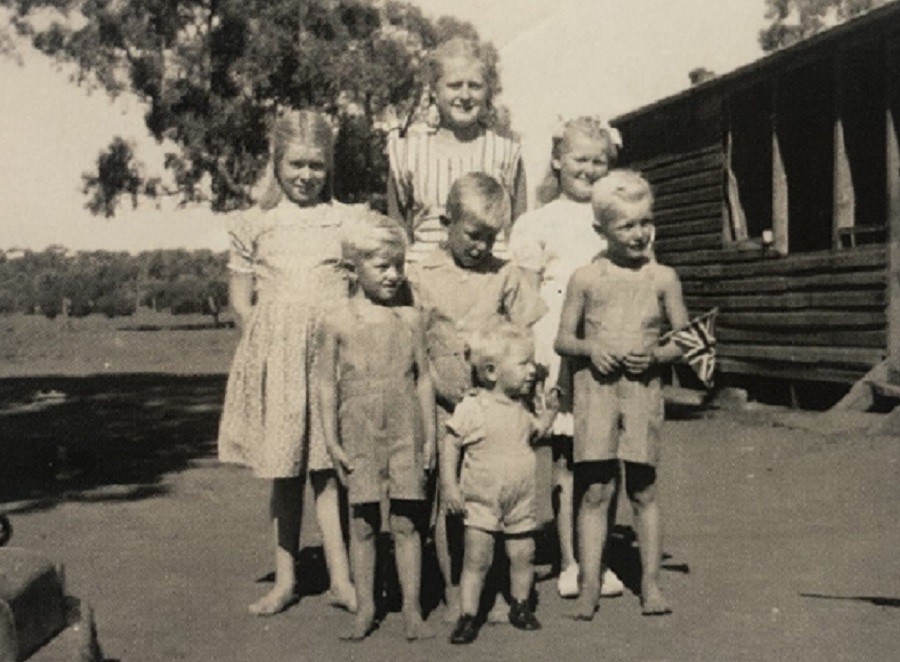
The Beattie Family, c.1955. From the collection Peter Beattie Papers 1955-1996. (John Oxley Library collection).
Although there is not a trace of self-pity in Beattie’s account of the young boy boarding a train in Sydney and travelling alone to far north Queensland to embark on an uncertain future, it is possible to glimpse here the indelible traces of an experience which would inform his political passion in the years to come. His childhood in the small town of Atherton where the prevailing political influences were if anything, conservative, are further marked by memories of having been “dirt poor”, basin haircuts, hand-me-down clothing, the indignity of his status as a ward of the state.
His second last year at Atherton High School (where he went on to excel as school captain and dux) coincided with the 1969 federal election and with Gough Whitlam’s emergence as an inspiring, electable leader bent on bringing about revolutionary social change. When Gough spoke convincingly about issues such as educational opportunity, the addressing of inequality and poverty, a universal health scheme, a young Beattie was listening with interest.
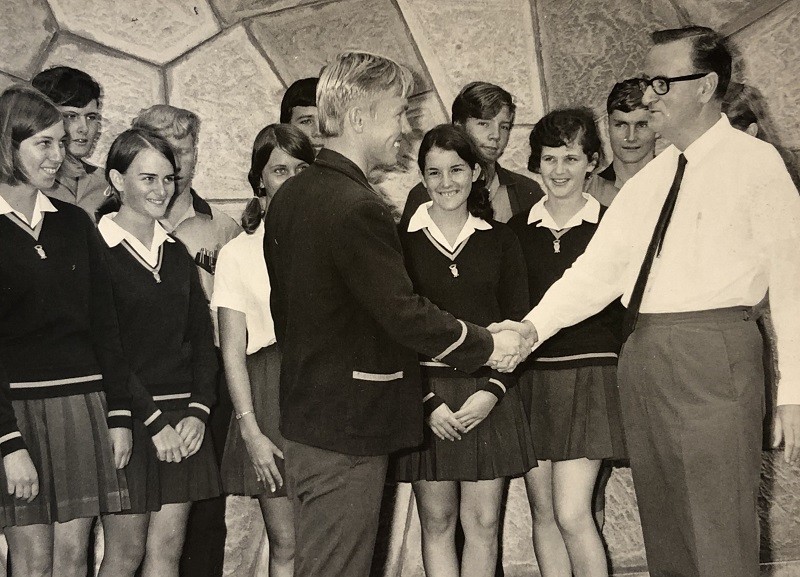
Peter Beattie receiving a congratulatory handshake at Atherton State High School where he excelled as Dux and School Captain. From 7110 Peter Beattie Papers 1969-2007 (John Oxley Library collection)
As a law student at University of Queensland, Beattie was open to the influence of a number of progressive movements which were transforming university campuses in the early seventies. The prevailing issues of social democracy, the right to march and protest and environmental conservation, particularly in relation to Fraser Island, were ones which inspired in him a resolution to address injustice in whatever way he could. His subsequent involvement in the 1971 anti-Springbok protest outside Tower Mill, the witnessing of aggression on the part of baton wielding police and his personal encounter with a police officer “land[ing] heavily on top of me” convinced him of the critical need for political change.
Following a brief but disappointing foray into Young Labor membership and the short term distraction of completing a law degree, Beattie’s resolve was once again prompted by another federal election, the 1974 double dissolution, where the focus was inevitably on the reform agenda pursued by Labor leader Gough Whitlam.
It is at the point where Beattie and his young wife Heather join the Australian Labor Party that the second story in this interview begins to unfold. It is the story of how the most enduring political party in Australian history was brought from a point where it couldn’t, to quote Beattie, “have run a chook raffle”, and was, in fact “on the “brink of destruction”, to a series of election victories which ended its 32 years in opposition in the state of Queensland.
The complex and eventful history associated with Queensland Labor’s reincarnation as a progressive and successful political force is interestingly shaped and reliably remembered by interviewer, Party insider and former Assistant State Secretary, Peter Shooter, who shares many of Beattie’s recollections. The keynote of their shared history is the reform movement, driven by a passionate group of reformists whose frustrations with the state Party’s historical shortcomings in the wake of the 1957 split were eventually addressed through federal intervention in the state branch in 1980-81.
In this second story the achievement of the reform movement is a point of reference in Queensland Labor’s history, coloured as it is with memories both of internal struggle and impressive input on the part of those who fought for sweeping changes in the policy and administration of the state branch. Peter Beattie speaks candidly about this experience, remembering a seminal meeting, in December 1977, at Indooroopilly and a succession of reform oriented meetings, some of them at the Bardon Hall, others at the homes of those members driving the push for change.
It was at the first Bardon Hall meeting in 1978, that University of Queensland academic Denis Murphy - subsequently elected as ALP State President and decades later, remembered for his outstanding contribution to the regeneration of the state branch - distributed his plan for thoroughgoing structural reform within the Queensland party.
Beattie makes substantial reference in his account, to the passion, intelligence and commitment of the reform group and to their uncompromising determination to transform the party in Queensland. He speaks of the critical role played by people such as Senator George Georges, Terry Hampson and Manfred Cross and he refers to the swelling support from the branch membership, witnessed by attendances at Bardon Hall meetings which numbered in their hundreds.
One of the practical targets of the reform agenda was the Queensland Branch’s woeful performance at both state and federal elections over recent decades and particularly in the 74 state and 69 and 74 federal elections; another was the narrow base of the seven member inner Executive of the QCE (Queensland Executive Council) who managed party business and among other controlling practices, influenced plebiscites for Senate positions and in state and federal seats. Known as the Trades Hall Group (and later as the Old Guard) they were typically dominated by blue collar unions, resistant to social and cultural change and intent on preserving the status quo. Beattie, like the rest of the reform group, sought to accommodate diversified views across the membership. He wanted to achieve a broad based party structure, to secure representation for women and to provide for the Party to respond to cultural and societal change.
Proportional representation in the form of a factional system was the mechanism via which the broad base of the membership was eventually achieved, along with representation for women on the Party’s Administrative Committee. Following the Trade Hall Group’s unsuccessful challenge to federal intervention in 1981, the new administration was installed at Breakfast Creek, at that time the ALP headquarters in Queensland, in early 1982. Beattie followed Manfred Cross in being elected as State Secretary of the Party and seized on the opportunity to introduce a series of modernised, scientifically based reforms in campaigning technique.
The application of these reforms was made worthwhile by the outstanding field of new candidates who were recruited in 1983 - Beattie mentions Wayne Goss, David Hamill, Anne Warner, Keith de Lacy and Paul Braddy - however a major electoral disadvantage persisted in the form of both the Gerrymander and the zonal malapportionment of state seats, given that Labor’s strength was obviously in those metropolitan seats where the quota of allocated electors was far greater than was the case in some country areas.
The story of the Queensland Labor Party’s path to its first election victory in 32 years is marked, from this point on, by a chronology of key political events which have been extensively documented in the annals of Queensland’s history – the misfortunes of the Bjelke-Petersen led National Party during 1987, the demise of the Coalition arrangement, the series of Courier Mail exposures of high level corruption by journalist Phil Dickie, the devastating impact of the ABC’s Four Corners Moonlight State episode in May 1987 which precipitated the Fitzgerald Inquiry - and the historical election of a Goss-led Labor government in Queensland in the 1989 state elections.
Beattie resigned as Secretary of the Queensland Branch of the ALP in July 1988 and, in the face of some internal opposition, secured endorsement and was subsequently elected the member for the state seat of Brisbane Central. The victory jubilation notwithstanding, Beattie’s early years in the Goss led government were one instance of the toughness which has been an integral aspect of his life in politics.
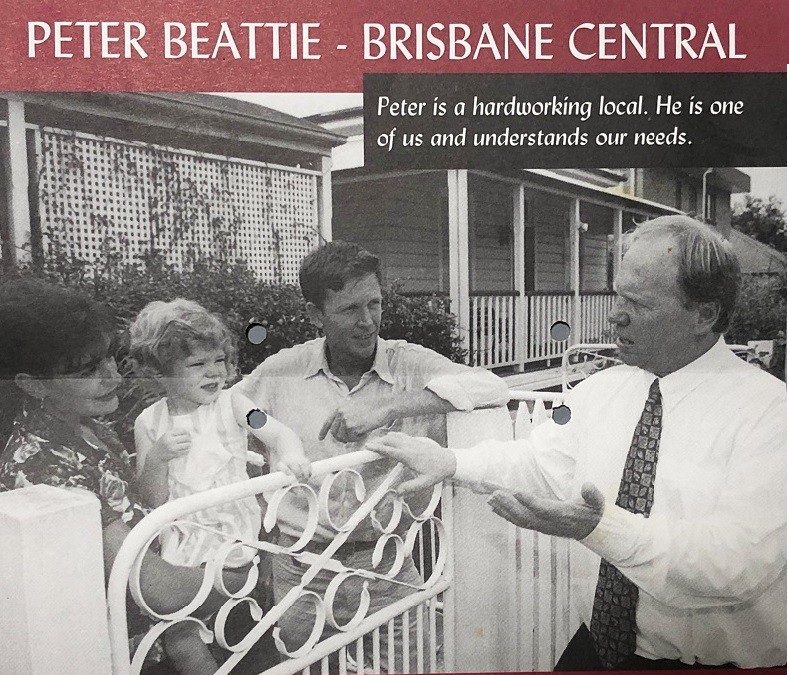
Peter Beattie campaigning in the seat of Brisbane Central in the 1989 state elections. From Elections - State : ephemera material collected by the State Library of Queensland (John Oxley Library collection).
In the interim between resigning as State Secretary and being elected in the 89 elections, Beattie returned to practise law and served as the Labor Party solicitor at the Fitzgerald Inquiry. In the wake of the Inquiry he was appointed as Chair of the newly established Parliamentary Criminal Justice Commission recommended by Fitzgerald, where he was charged with oversight of electoral, administrative and criminal justice reform. When, in 1991, the CJC at the direction of Commissioner Sir Max Bingham, launched an enquiry into the “possible misuse” of parliamentary travel entitlements between 1986 and 1989, Beattie supported the work of the Commission, refusing to limit the inquiry in the interests of some parliamentarians who had rorted travel allowances. Inevitably this principled, independent stand was unpopular in government ranks, a circumstance which no doubt informed his subsequent three year appointment to the much less controversial Public Works Committee.
Mundingburra, the seat of the by-election which followed the Coalition’s challenge to the 1995 state election result (in which Labor had lost nine seats and retained power with a precarious one seat majority), is remembered as the catalyst for a dramatic turnaround in Beattie’s ascent to leadership. There followed a series of events which determined a new course in Queensland’s political history: Labor’s subsequent loss in the 1996 Mundingburra by-election, the Coalition’s securing of government with the support of independent Liz Cunningham, Goss’s resignation and Beattie’s election as leader in opposition of the Queensland Labor Party.
Beattie’s success in gaining the crucial support of independent Peter Wellington in the aftermath of the 1998 state election is widely attributed to the same outstanding communication skills which characterised his time in office during four terms as Queensland’s popular Premier. There was however another ingredient critical to his success as a leader - and that was his vision for Queensland. His ambition was, in the words of interviewer Peter Shooter, “to change the thinking of Queenslanders and to change the attitude of the rest of Australia to Queensland…”
Contributing substantially to the achievement of this ambition was Beattie’s Smart State agenda and its overarching emphasis on innovation, particularly in the areas of information technology, biotechnology (the basis of Queensland’s current status as an international player) and the aviation industries. The Beattie Government’s commitment to higher education resulted in the establishment of University of Queensland based Centres of Excellence such as the Institute for Molecular Bioscience (IMB), the Queensland Brain Institute and the Institute of Bio-Engineering and Nanotechnology. (The enduring value of these initiatives was formally acknowledged in 2010 when Beattie was made an Adjunct Professor in Bioscience and Nanotechnology at the University of Queensland.)
Smart State initiatives also brought about increased funding for TAFEs, a significant investment in scientific research and an energy strategy focused on sustainability and the application of renewables. Happily for institutions such as State Library of Queensland, the Beattie government’s Smart State oriented vision extended to the cultural sector, one consequence being our present, beautifully appointed building at South Bank, another being GOMA , the largest modern art gallery in the southern hemisphere.
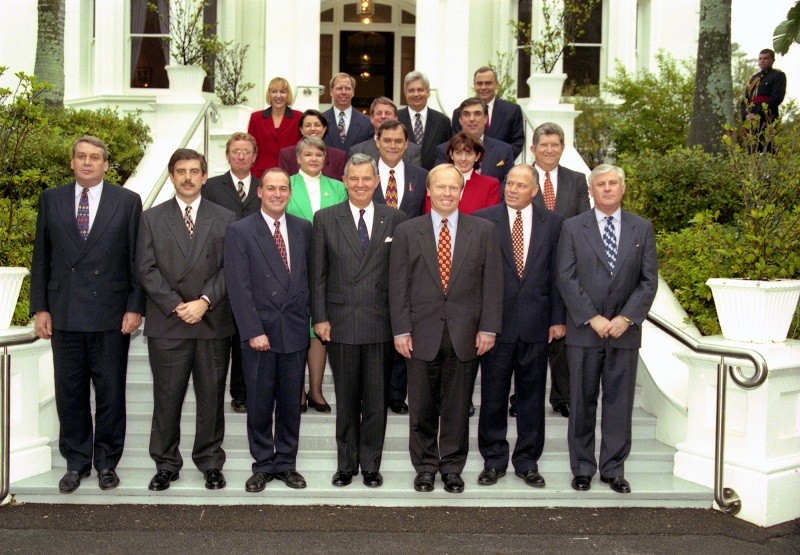
The first Beattie ministry, 1998. (Photograph courtesy Queensland State Archives collection).
This achievement in office - and the Beattie Government’s continued re-election - were pursued in the face of a series of difficult events which both tested and revealed the Premier’s integrity and insistence on high ethical standards in the office of government. In his first term in government the Criminal Justice Commission (CJC) pursued accusations of illegal electoral enrolment designed to influence internal Labor Party pre-selections. It was with the support of Beattie that the CJC subsequently established the Shepherdson Inquiry’s investigation into electoral fraud, the outcome of which was the forced resignation of senior Labor figures including the Deputy Premier.
There are two intriguing aspects to this historical event. In what was to become the hallmark of Beattie’s personal stamp in public office, he refused to defend or cover up wrongdoing on his side of politics. His public response to events like the Shepherdson Inquiry was at once refreshing and disarming and the tough action he took appeared to be largely approved of by Queensland voters. Nevertheless, the 2001 state election result, a landslide 66 seat win for Labor, is still regarded, given the circumstances, as an extraordinary event in Queensland’s political history.
There is, of course, a great deal more to Beattie’s story. It is a story which moves, following his resignation as Premier in 2007, into a post political career marked by a record of achievement and, to a significant extent, a continuing link with the state of Queensland. As Queensland Trade Commissioner to the Americas for two years he negotiated record trade deals for Queensland companies. At Clemson University in South Carolina (established as Queensland’s “sister state” a decade previously) he was appointed as an adviser and guest lecturer on global economic development strategies, with application to biotechnology and renewable energy. In 2010 he was made Director of the Melbourne-based Medical Research Commercialisation Fund. In 2018 he was appointed Chair of the Gold Coast 2018 Commonwealth Games Corporation (GOLDOC) Board.
At the time of this interview Beattie was yet to retire from the role he had filled since February 2018, as Chairman of the Australian Rugby League Commission. During his twenty months as Chair he is widely recognised as having achieved positive and collaborative stakeholder engagement in relation to the game and its associated industries. His achievements in this role include a significant expansion of women’s rugby league, advances in relationships with the Aboriginal and Torres Strait Islander community and oversight of a range of integrity reforms.
Peter Beattie’s story, like the story of the party he led through four terms of office, is not just inspirational - it is, very obviously, a significant part of Queensland’s political history and it will no doubt inform a multitude of other histories in years to come. A distinction of this interview, in the context of those historical records, is that it offers as well, a window on to events and incidents not on the public record - all of them related with Beattie’s characteristic candour, spontaneous sense of humour and philosophical approach to the tapestry of political life.
We are privileged to have had the opportunity to record this important conversation. In sharing it with our online audiences we acknowledge the generosity shown to State Library by two people who witnessed at first hand, a series of extraordinary events which changed the course of Queensland’s political history.
The Hon. Peter Beattie in conversation with Peter Shooter / Interviewer Peter Shooter. Produced by The Picture Club. Commissioned by State Library of Queensland, 2019.
Further reading:
TR 2103 Peter Beattie Papers 1955-1996 One of several large collections of Peter Beattie Papers from the John Oxley Library collection. The papers cover the years between 1955 and 2010 and include photographs, correspondence, diaries, political ephemera, clippings and other material.
Report on an investigation into possible misuse of parliamentary travel entitlements by members of the 1986-1989 Queensland Legislative Assembly / Queensland. Criminal Justice Commission ; Sir Max Bingham; Toowong : The Commission ; 1991
Gough Whitlam, Australian Labor Party. [Speech] delivered at Sydney, NSW, October 1st, 1969. Museum of Australian Democracy. https://electionspeeches.moadoph.gov.au/speeches/1969-gough-whitlam
Libby Fielding - Specialist Librarian, State Library of Queensland
Comments
Your email address will not be published.
We welcome relevant, respectful comments.